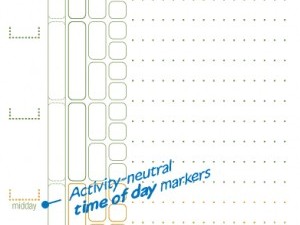(last edited on October 21, 2022 at 11:08 am)
I love the idea of collaboration. It’s such an open, positive-sounding term, harmonizing sweetly with concepts like sharing and cooperation. It’s an idealistic term too; when I close my eyes, I imagine a spring meadow filled with people young and old, their hands linked gladly together. It all sounds so nice. And yet…somehow it isn’t quite me.
Maybe I’m a product of the old school, born too late in the Digital Revolution to have absorbed the essential optimism of Web 2.0. I certainly can feel it, but it doesn’t run as deep as an older pattern that I identify with, that of the outsider working against the system. In other words: I miss being a schemer, getting together with my co-conspirators to hatch some new head-exploding idea. Maybe this is a natural reaction from having run in “transparency mode” for so long, letting all my intentions and feelings show as plainly as I can.
Elements of a Good Schemer
The word “collaboration” has such an agreeable sound. It’s a very bright, mature-sounding word, just what you’d need to craft that great team slogan. It smacks of open communication and transparency. I have to admit, though, that I feel a greater connection to the schemers. Maybe it’s because the word “collaboration” sounds so darn responsible and adult, and I’m feeling like I need to have some fun. While I’d take “collaboration” over “hostile opposition” any day of the week, having a co-conspirator is even better.
It’s a pity that “scheming” is almost universally associated with immoral behavior. Schemers have secrets and are underhanded. Schemers have agendas and talk in whispers. But you know what? Schemers are the ones who are plotting the big exciting things. Now, I’m not promoting terrorism or illegal activity, but I think that there’s something pretty darn cool about defining your goals in opposition to something you feel strongly about. This is a form of passion. Sometimes, these passions must be nurtured in secret before they are strong enough to stand on their own and face the light.
So what does one expect from a good “co-schemer”?
- A co-schemer buys into your idea completely, because it’s their idea too.
- A co-schemer is passionate about “the cause”.
- A co-schemer is a natural catalyst to other co-schemers, generating energy
- A co-schemer has your back when things go all pear-shaped.
By comparison, a good collaborator focuses on slightly different things:
- A collaborator contributes their piece to a whole
- A collaborator is passionate about collaborating with people
- A collaborator keeps a project going by adding their piece
- A collaborator focuses his attention on the project
I’m seeing a kind of emotional vs rational duaity here: schemers are passionate about doing, and collaborators are reliably productive. It’s pretty clear to me that you need both to find the perfect partner in crime. Up to now, I think I have been mostly focusing on the elements of a good collaborator (rational). I haven’t really thought about scheming as a necessary component.
Scheming Checklist
What should you look for in a good schemer?
- They laugh at your obscure jokes
- They are serious about The Cause, but not so serious that they can’t joke about it
- They are able to “keep up”
- You find yourself talking constantly about The Cause with them
- You prod each other into results-producing action.
- They happily celebrate every result with you
- They can readily envision and communicate what the world would be like when The Cause comes to fruition
- They leave you feelingl energized, not drained
Finding a co-schemer is more difficult, because you’ll have to make yourself vulnerable by broadcasting your crazy ideas, risking ridicule. But you know, it’s totally worth it: I met one of my best friends in the 10th grade while we were moving some boxes around for a school fair. We found that we were both interested in computers, and for some reason I offhandedly mentioned that I could imitate the sounds a disk drive made when booting a favorite game. Which I proceeded to do. Result: life-long friend and former game company startup co-conspirator. To find these people, you’ve got to take some chances. When you find the right co-schemer, the universe will be a more joyful place.
Why Scheming?
So what is it about scheming that’s so attractive? For me, it’s the challenge of surprising the status quo by introducing my own ruleset. Schemers pit themselves against the world, seeking to change it through extraordinarily clever ways. It’s a counter-cultural attitude to have, and you need to have a LOT of that attitude if you want to effect really big changes. Otherwise, it’s far easier to just go along with what’s going on. Everone else is doing that already. To scheme is to see the whole of life as something that you can change by changing the rules. It takes a special person to recognize that.
In Conclusion
That’s all I really have to say on the subject. If you’re stuck on some particular part of your life, maybe you need someone to scheme with. It’s no fun scheming alone…you need someone who both has the ability and skills, AND the right kind of crazy to match your own. If we were all in the same room I’d make everyone pick a Scheming Buddy. I certainly can use a few now. In lieu of making disk drive noises (I can see the young’uns out there scratching their heads, wondering what the heck I’m talking about), I will just point potential applicants to My Gauntlet of Productivity, which is the dorkiest thing I’ve put online. Are you this kind of crazy? Can you top it? If so, I think we had better talk. :-)






13 Comments
Nice post, Dave. Kinda makes me think of Monty Python (this may be due in part to the fact that I’m currently reading Michael Palin’s diaries).
The dorkiest thing I put online was my own language I was making for a video game. It had a few thousand words as far as I recall. très dorky.
I love the gauntlet of productivity – don’t know how I missed that post this past fall.
I’m trying now to think about how I can make one with stuff I have on hand… maybe adapt a sock or knitted tube for that DIY fashion look. I want to be able to write and sketch on the surface, too. Maybe a tiny pocket for my flash drive as well as a loop for my fountain pen? Hmm.
Dave: I wrote this last night, and fell asleep without posting it. It is so inline with what you wrote last night (that I just read) that I thought I would pass it on:
Dave and others:
Another thought on reading and rereading Dave’s post, and the comments that follow: I think the reason Dave speaks of co-conspirators, co-schemers and “villainy” is because he is always speaking of creating something NEW. Making something new means overthrowing something old, if it’s really going to be new. New models, new paradigms only emerge after we’ve amassed huge amounts of data, and even then most people will resist the new, and hold on to the old, even when the old isn’t working, or never worked. When someone is creating something new, the resistance is tremendous. To step forward with a truely new idea brings with it, something revolutionary, something that must overturn the old. To make a revolution together, people have to become villains to the old guard, to be treated with suspicion and stopped if possible. The very act of creating something new is wrapped up with revolutionary sentiments, and a revolution can’t happen without long periods of very solid scheming. People who are at the forefront of anything are often scorned, and faught against with breathtaking ferocity. Co-scheming has to be at the heart of a successful revolution. My mentor and I were scheming about changing a whole paradigm about basic human motivation; this gave us energy that was remarkable, and slowly we have been joined by others in different disciplines in science, or we joined others who were scheming in the same directions. But there is serious ambition behind these potent relationships that are so creative and almost explosive. I think you want co-schemers to change a social order, to put it modestly. You speak of it obliquely in your blog, sometime more directly but often very indirectly. I wrote to you quite a while ago that I thought you were speaking of political leadership when you spoke of community and what you wanted, as you described your vision. I still think you are right on target with your idea of co-scheming, and it is because the ambition, the target of the scheming, is social and political change, about the biggest ambition I can imagine. Go Dave, you clearly speak for many of us, and the goal here will become apparent as it evolves in many directions.
I like to “co-” things too. For instance, commingling is much better than mingling alone, even if that’s not what it means. I’d say the same thing about collusion that you say about scheming- it basically connotes illegality, but sounds fun. I guess collaborators could also have an negative sense if you think about it in a WWII context.
It’s funny how “cooperation” has such a lame, kindergarten connotation compared to the trendier “collaboration”, despite similar denotations. Collaboration is more coming from the sense of elaboration, and cooperation is coming from the sense of operation. I think co-creation was the buzz word of a couple years ago, and it gets to the heart of it for me.
I didn’t understand it as scheming, but I think I have a real-world example of having a co-schemer. (the idea may be juvenille but it works).
I work at a web development company. Employees there get two fifteen minute breaks. Our primary mode of conversation is Miranda instant messaging. Because all of our conversations are kept in a history ( and used to fire the unproductive) myself and other employees devise new words to avoid using words that may cause a rucus ( some use it to mask profanity). It’s somewhat similar to LOL and what not.
To make a long story short, a fellow co-worker and myself like to play pingpong on our breaks, sometimes we sneak in “extra” breaks. We loving refer to this as “Paid Ping Pong” or over Miranda “triple P”. It’s become this sort of secret way to break the monotony of SEO and content-drops. I’ll message my buddy: “triple p” and he’ll respond with the same. We will silently leave our desks and meet at the ping pong table.
We’re even creating a trophy out of a styrofoam cup, and have discussed making a website for it. We throw around plans for “tiple p” and have considered bringing outsiders into it. I realize this seems child-ish and if our supervisor wanted to they could probably interogate us about the meaning of “triple p”.
Nevertheless I see it as meeting a lot of the requirements you lay down for a co-schemer. It’s something that brings out the unproductive, but on some non-obvious level it increases productivity and has a very different bond than that of co-workers that I collaborate on projects with. I think scheming could be like throwing a handful of darts at a dart board, while blind folded, over and over again. Eventually you’ll land some higher points. I think most people look at the darts that don’t hit the board at all and abandon scheming to pursue collaboration. I’m still holding on to the idea that maybe I’ll get a dart in the bulls-eye, but untill then I enjoy the thrill of throwing blind-folded.
I found a co-schemer once. It was awesome! We sat and talked about how awesome things would be. Discussed the difficult parts of the application we were building. Learned from each other. Wrote massive amounts of code. It was so awesome then… we had sex. She was beautiful. The collaboration continued into our private lives. We are planning to get married at the end of the summer.
When someone says “collaborator” to me, I tend to associate negative qualities (Godwin prevents elaboration here).
Must just be me.
Sam: Michael Palin has diaries available? That sounds like a great read!
Steve: Your own video game language is pretty darn cool. You’re in good company with Tolkein.
Elizabeth: I’d love to see a knit version of it! That would be cool! I wonder how hard it would be to make one out of leather? I can just see it!!!
Lynn: I think you’re onto something in your inquiry. I do like newness, particularly in the context of overthrowing lameness, which I would broadly define as that which stands in the way of people doing great things just because someone else doesn’t think it’s such a great idea. There are several ways one can approach this…I tend to be more of an individualist than a statist, personally.
Matt M: Good point about collaborators having a negative WWII vibe. You’ve made me think that there’s a critical difference in the kind of scheming, collusion, etc I’m thinking of: TRANSPARENT SCHEMING. Apple is maybe a good example of this: their mission is pretty much out in the open, and made real through good products and the community that has embraced them. However, their internal process and plans are quite secret and special, and not privy to the outside world.
Matthew Booth: Heh, that’s a great story about “triple-p” :-) There’s a part to scheming that’s just fun…the sense of getting away with something, being clever, working around the system that otherwise might be in the way. It’s one of the qualities that I really enjoy in people, the irrepressible will to do that what must be done…to borrow from one of my favorite movies, “it’s a moral imperative” :-)
Ashamed: Sounds like a happy ending! :-)
MJ: Clever workaround Godwin’s Law. You’re not alone in the collaborator feeling, with its strong WWII connection. Viva la Resistance!
This is great stuff. Because of the way you depart from the stereotypes and commonplaces of “collaboration,” you ought to expand these ideas on good scheming to an article. Could even be a small book!!
Yet another buzz word, “collaborating” is just the latest feel good term for plays well with others. Scheming is where the real work gets done.
Scheming is useful not only in the creation of new things but also, or even more so, in the fixing of broken things. Especially when the status quo has benefits for the Powers That Be – or when TPB is simply uninterested in the problem.
John: Thanks man! Maybe in a few years, when I have more data and experience, I’ll be able to pull it all together. Right now I can just hypothesize.
Magpie: Thanks for the insightful comment. Fight the power! :-)
David,
The other night, during a conversation with a friend, I realized that a key reason for my frustration of late has been my inability to find people with whom to scheme. I typed scheming into google and found this marvelous post. I then churned out a quite lengthy post of my own called My Scheme Team Dream: Partners Wanted for Shaping and Changing The World, in which I quote this post many times.
I realize my post is quite long. Unfortunately, I wasn’t able to sum up how I felt as concisely as you managed to in your own post on the subject. But if you (or anyone else) manage to find time to read it, I hope you’ll leave me some feedback and let me know if perhaps we are potential co-schemers who should be in touch more sometime.
Thanks for the great post!
Howard